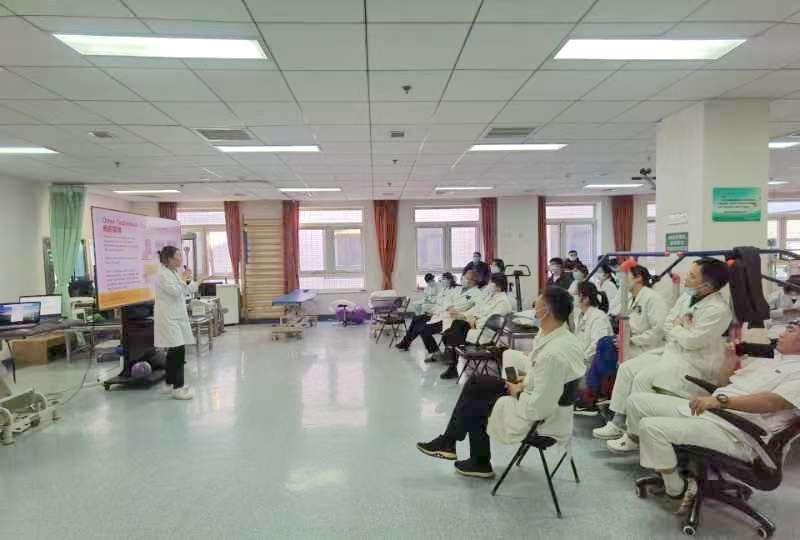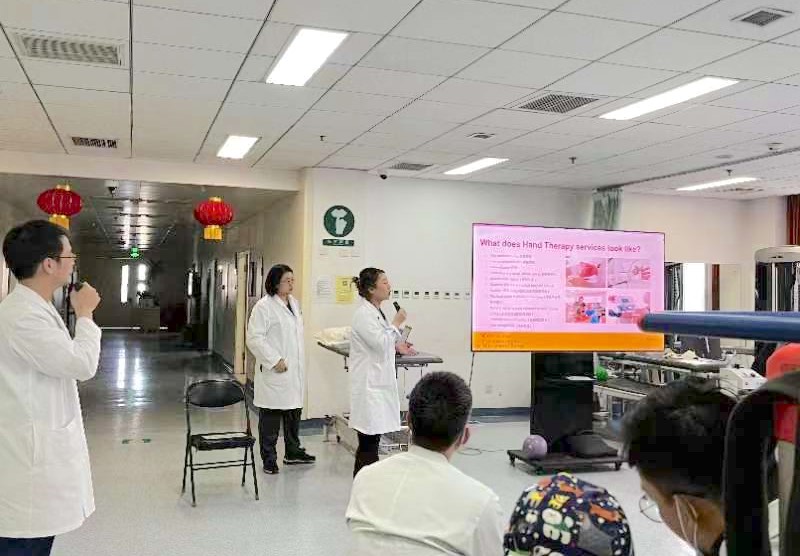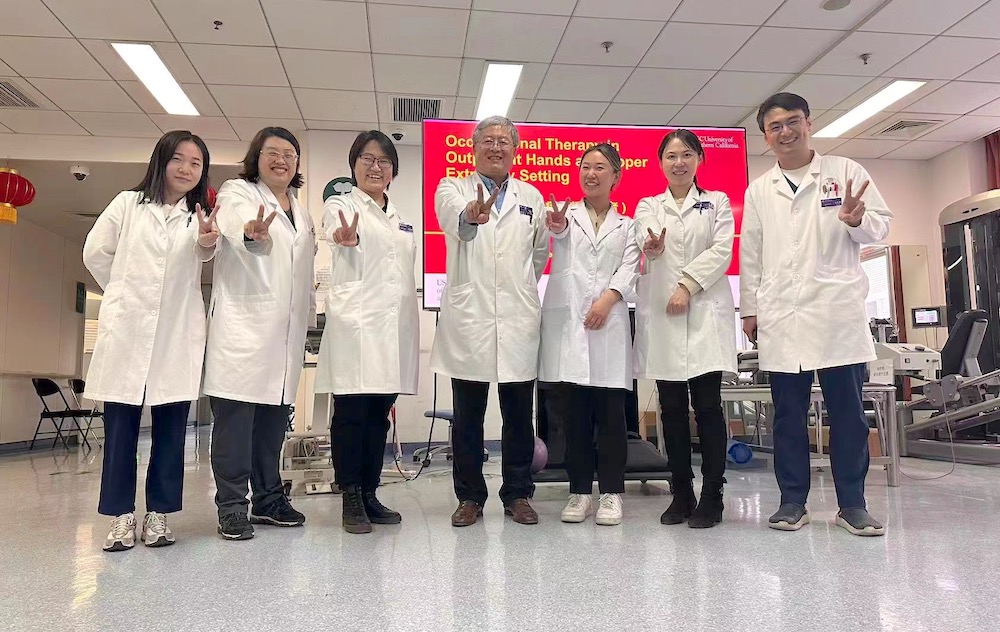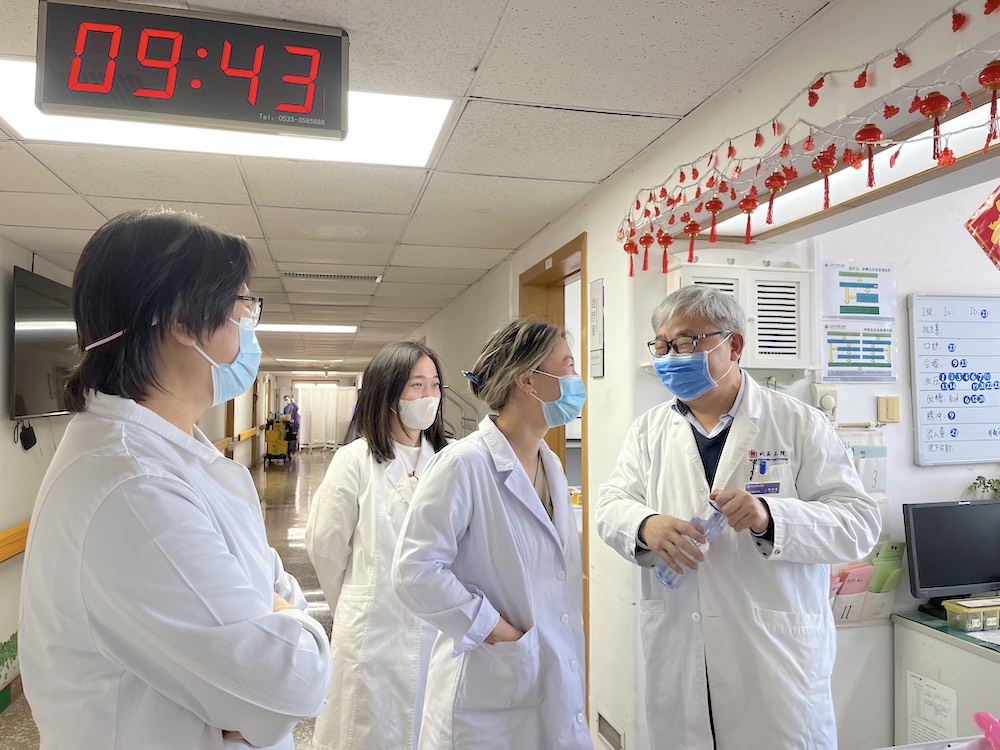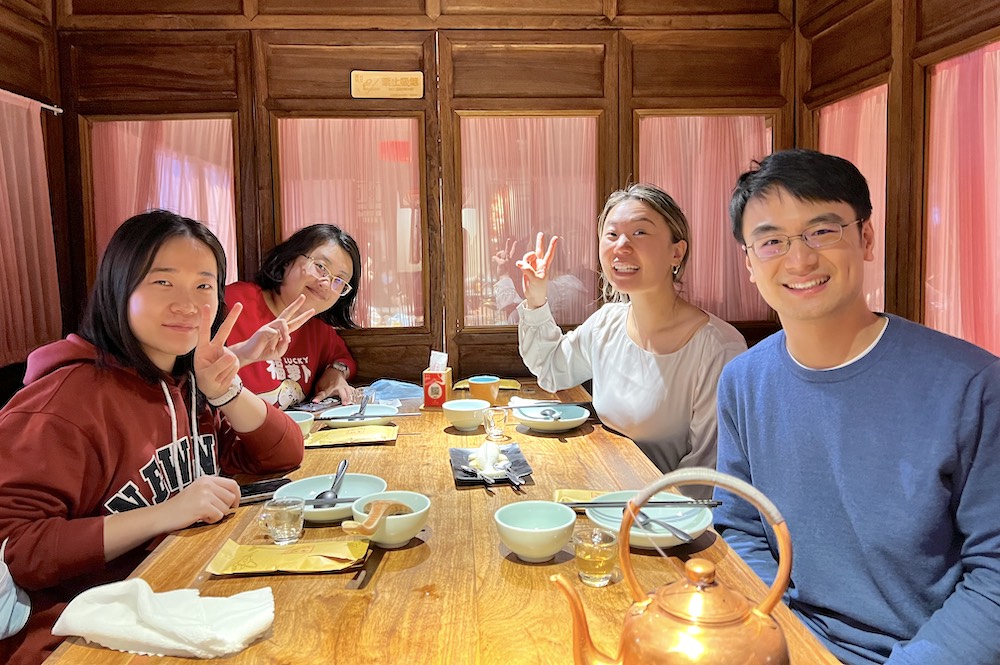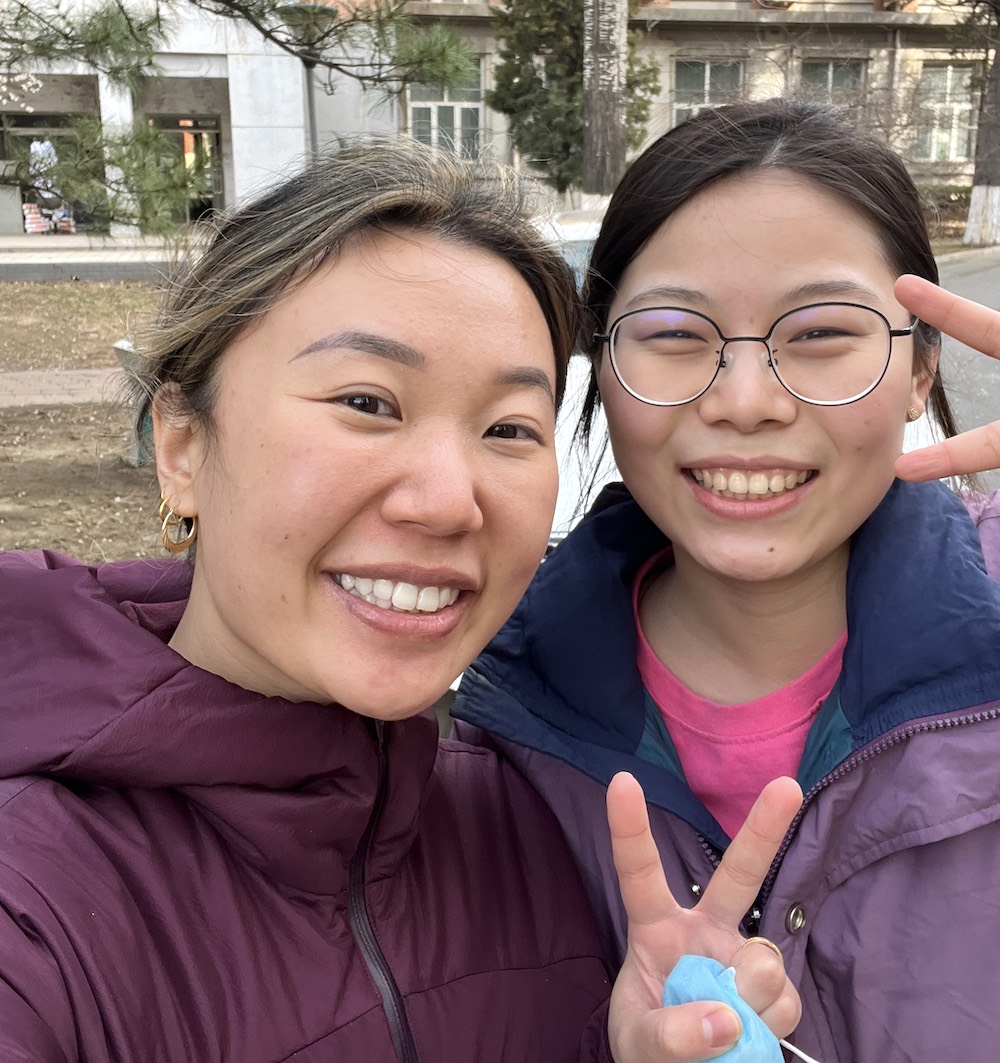USC Chan Student Completes Externship at PKUHSC in Beijing, China
April 3, 2023
USC Chan Entry-Level Master’s student Tina Peng discusses her externship at Peking University Health Science Center (PKUHSC) in Beijing, China, focused on building leadership skills and learning about local occupational therapy (OT) practice.
Academics and Courses China Initiative Community and Partners International Students
Every spring, second-year Entry-Level MA students participate in a student-driven externship assignment designed to build their leadership skills, provide opportunities to learn about non-clinical roles of occupational therapists, and help develop a sense of professional identity. As part of this required assignment in OT 540 Leadership Capstone, students independently research and network with their desired externship sites, and set parameters — frequency, duration, roles, and responsibilities — for their externship in collaboration with their sites.
This year, Tina Peng chose to complete part of her externship across the globe in Beijing, China at Peking University (PKU) Third Hospital. USC and PKUHSC have a longstanding relationship through the China Initiative, which supports a dual-degree program in which graduates from the master’s program at PKUHSC complete their occupational therapy doctorate (OTD) at USC. As such, the China Initiative team interviewed Tina to learn about her externship experience and takeaways following her time at PKUHSC.
Q: Can you describe the “theme” of your externship at PKUHSC?
A: One word to describe the theme of my externship is “leadership.” I focused my externship on exploring leadership throughout the integrative clinical experience, from primary care to referral and outpatient to discharge. I was supervised by Dr. Hui Wang (王慧) and Dr. Liguo Qian (钱李果). I shadowed the head physician of the neurorehabilitation department, who took me on a tour of the campus and allowed me to shadow her in acute inpatient wards. I met with a lot of the leadership in the PKU system, like the chair and vice chair of the hospital, and Prof. Mouwang Zhou (周谋望), a Chief Physician in the Department of Rehabilitation Medicine. Prof. Zhou encouraged me to write a wishlist of what I wanted to do, and empowered me to get out of my comfort zone. So, I asked to lead a one-hour presentation about occupational therapy services for the hand and upper extremity, which was interpreted to Mandarin Chinese by Dr. Qian. All of the department chairs were there! It was a really great way to practice being a leader and lecturer.
USC master’s student, Tina Peng (pictured on the left), gives a hand therapy lecture to rehabilitation therapists and hospital department chairs in the Peking University Third Hospital main gym.
Q: Why did you choose to complete your externship at PKUHSC?
A: I was born in China but moved to the U.S. when I was 9 years old. I was fascinated by the China Initiative when I started the program. I have family in China, and when I told them I was going to USC for occupational therapy, I observed a lack of understanding and awareness of occupational therapy’s value and scope of practice. I thought that this experience at PKUHSC could help me understand China’s perception of OT and what’s possible for OT there, like learning about what Western healthcare looks like in Eastern culture and environment. How do they define “holistic?” PKUHSC provided me with the perfect opportunity to explore this by providing a supportive environment and the opportunity to meet 5 amazing OTs who work in their own specialty (ICU, hands and the upper extremity, neurorehabilitation). And also it helped to strengthen my Chinese!
Q: What was your most memorable experience, and how did it impact you?
A: The most memorable experience was talking about scar management during a lecture on the hands and upper extremity. It was only a portion of my entire lecture, but to the practitioners at PKUHSC, it was the most standout portion! It seemed commonplace to us [in the U.S.] to incorporate scar management into hand therapy, but it was new to them. Occupational therapists in China don’t cover that because it is within the physician’s scope of practice. Even physicians who supported OT’s role in scar management believed that it was for purely cosmetic, psychosocial reasons. It was rewarding to talk to them about how much scarring can impact function, or limit range of motion. I realized that what is “common” in our scope of practice in the U.S. is not so common in China.
Liguo Qian, OTD (pictured on the far left) and Hui Wang, OTD (pictured in the middle) provide interpretation to PKU Third Hospital practitioners during Tina Peng’s presentation on hand therapy practice in the U.S.
Q: What was challenging about the externship?
Definitely the language barrier. I am fluent in Chinese, but I am not as strong in professional language. It was difficult to understand the medical terminology that I heard in everyday practice. This was especially challenging during my lecture to PKUHSC practitioners. I felt that some concepts were lost in translation. Luckily, Dr. Wang and Dr. Qian gave me so much support in interpreting. They were great role models — their knowledge extends past OT into all of physical rehabilitation in general, so they were able to bridge that gap and teach me more professional language in Chinese.
(L to R) Luming Yang, OTD (杨璐铭); Hui Wang, OTD; Yang Yanyan (杨延砚) MD, PKU Third Hospital Physician; Guoqing Cui (崔国庆) MD, Director of the Rehabilitation Medicine Department at PKU Third Hospital; Tina Peng; Xiaoxuan Liu (刘小璇), MD; Liguo Qian, OTD
Q: What leadership skills did you observe in local OT professionals, and what did you learn from them?
A: Kindness and humility. From the moment I started, I realized how big PKUHSC is, like how well-known they are and their ranking in China. Especially, Dr. Guoqing Cui (崔国庆), who is a highly respected and renowned physician in all of China. People from all over the country would travel to see him. Some would even line up to talk to him or ask him for his phone number. In addition to his large caseload, he was supporting multiple students — myself and seven others. Even with his busy schedule, he took his time with each patient and made sure they were heard. He embodied what I believe all healthcare professionals should look like: someone who is humble, who emphasizes humanity, and someone genuinely kind. I was touched by his dedication, and felt especially inspired to take these attributes home.
Hui Wang, OTD; Luming Yang, OTD; Tina Peng; and Mouwang Zhou, MD exchange laughs during early morning rounds.
Q: Did your experience change your perspective on the role of OT in different cultures?
A: 100%, definitely. In such a huge hospital like the Peking University Third Hospital, there were only 5 OTs. And this hospital served patients from all over the country. It really reflected the dearth of OTs, and they’re all considered “rehabilitation therapists,” regardless of specialty. For example, when the caseload is too large, OTs will do gait training and strengthening of the lower body. And PTs will do ADLs. Another thing I noticed was the emphasis on physical rehabilitation, rather than functional components. Even in acute care, it’s not prioritized. I realized that there is a huge need there, like awareness of functional impact or OT’s scope of practice.
Q: How did your own leadership skills grow during your externship?
A: Because the leadership at PKUHSC gave me so much freedom, it pushed me into being more independent in forming my own experience. They were so accommodating, and I felt that I paved my own path. It helped me learn to advocate for myself, like saying “I would like to see this” or “I need support in this.” They trusted me to realize my own professional interests, and it gave me a lot of confidence to succeed.
Q: How do you plan to apply what you’ve learned at PKUHSC to your personal and professional life going forward?
A: I have more interest in exploring the field of hand therapy. My goal is to become a Certified Hand Therapist, but I do want to bring that to China in the future. I’m exploring the idea of returning to China and bringing high quality hand therapy practice and education to China. I want to be an agent for change.
Q: What advice would you give to someone who is considering completing their externship or OTD capstone in China, or specifically at PKUHSC?
A: My main advice? Know what you want to see! They have different settings, like mental health or children’s hospitals. But also know what you’re getting into — rehabilitation looks different there, so don’t expect to see the same exact thing that you might see in your fieldwork rotations. That being said, there’s so much to learn from them, so be open minded. They’re open to teaching and genuinely want you to excel.
Q: What did you learn about the Chan Division’s relationship with PKUHSC or the China Initiative from this experience?
A: This opportunity wouldn’t have been available without the help of Dr. Elena Meng. I was incredibly grateful for this connection. What I realized about the relationship with PKUHSC was that they have a professional relationship that lies on a solid foundation of friendship. For example, Dr. Wang and Dr. Qian spoke highly of Dr. Gray and Dr. Meng, and shared many stories of their travels in China, like seeing traditional dances or eating meals together. The leadership at PKUHSC also loves USC, especially Dr. Gray, for making the CI collaboration happen. I think they did more than they needed to or even had time for, because I am a USC student. I even personally was able to foster great friendships with Cohort 2 and Cohort 3 from PKUHSC — next week, we’re going whale watching!
⋯
Following the interview, Dr. Hui Wang and Dr. Liguo Qian provided positive feedback to the China Initiative team regarding Tina’s externship, stating that PKU Third Hospital rehabilitation therapists, physicians, and other healthcare practitioners were also able to engage in and learn from meaningful reciprocal learning interactions with Tina. PKUHSC leadership also expressed interest in hosting future USC Chan students who are interested in building their leadership skills, networking with rehabilitation therapists in China, learning about occupational therapy practice across the globe, or advocating for high-quality occupational therapy practice and education across the globe. This exciting exchange reflects the strength of the partnership between USC and PKUHSC, which will continue to give way to unique opportunities for students from both schools to become well-rounded and culturally sensitive occupational therapists.
⋯






